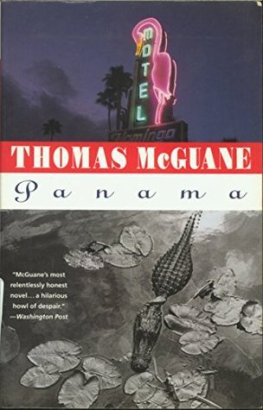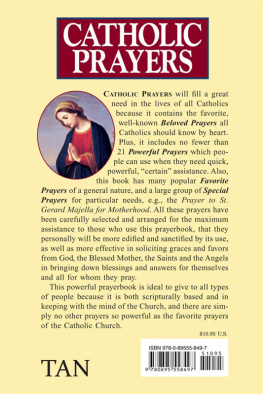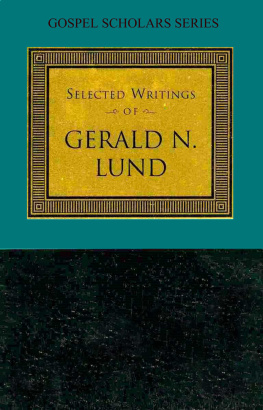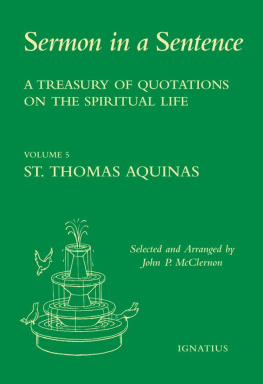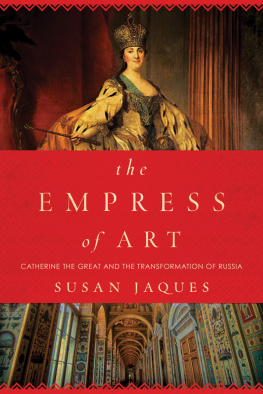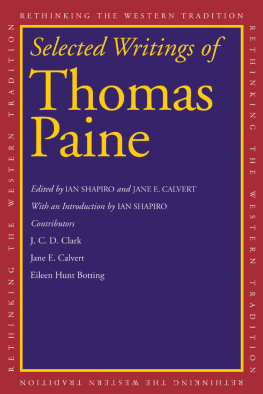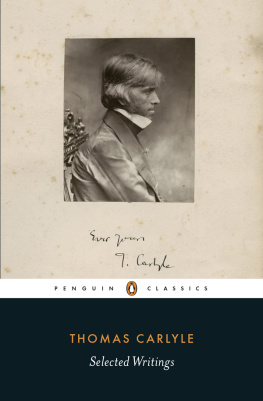The Gospel Scholars Series: Selected Writings of M. Catherine Thomas
M. Catherine Thomas
2000 M. Catherine Thomas.
All rights reserved. No part of this book may be reproduced in any form or by any means without permission in writing from the publisher, Deseret Book Company (permissions@deseretbook.com), P.O. Box 30178, Salt Lake City Utah 84130. This work is not an official publication of The Church of Jesus Christ of Latter-day Saints. The views expressed herein are the responsibility of the author and do not necessarily represent the position of the Church or of Deseret Book. Deseret Book is a registered trademark of Deseret Book Company.
Deseret Book is a registered trademark of Deseret Book Company.
Visit us at www.deseretbook.com
Library of Congress Cataloging-in-Publication Data
Thomas, M. Catherine [Selections. 2000] Selected writings of M. Catherine Thomas. p. cm. (Gospel Scholars series) Includes bibliographical references. ISBN 1-57345-796-5 (hardcover) 1. Christian lifeMormon authors. I. Title. II. Series.
BX8656 .T48 2000 248.4893dc21
00-034650
Printed in the United States of America72082-6670
10987654321

Publishers Preface
In recent decades, a number of exceptional Latter-day Saint scholars have expanded our understanding of many gospel subjects. In many cases, however, much of what they have written (or given as speeches) has been published for relatively small audiences, or it was published so long ago as to be unavailable or inaccessible to most readers; in some cases an article or paper has never been published at all. Now Deseret Book is pleased to bring together some of the best of the best in the Gospel Scholars Series.

Key to Shortened References
Conference Report
Official reports of general conference sessions of The Church of Jesus Christ of Latter-day Saints. Salt Lake City, Utah, 1899present.
Gospel Doctrine
Joseph F. Smith. Gospel Doctrine: Selections from the Sermons and Writings of Joseph F. Smith. Salt Lake City: Deseret Book Co., 1971.
Journal of Discourses
Journal of Discourses. 26 vols. London: Latter-day Saints Book Depot, 185486.
Lectures on Faith
Joseph Smith, Lectures on Faith. Salt Lake City: Deseret Book Co., 1985.
Teachings of the Prophet Joseph Smith
Joseph Smith. Teachings of the Prophet Joseph Smith. Selected by Joseph Fielding Smith. Salt Lake City: Deseret Book Co., 1976.
Words of Joseph Smith
Andrew F. Ehat and Lyndon W. Cook, eds., The Words of Joseph Smith: The Contemporary Accounts of the Nauvoo Discourses of the Prophet Joseph. Provo: Religious Studies Center, Brigham Young University, 1980.
Scripture Studies
Chapter 1
Premortal Election and Grace

The world finds Gods election of Israel inexplicable, but it would not do for the covenant people themselves to misunderstand their own election. The reason for Israels election has important implications for us during our mortal probation.
Here is one oft-cited passage from Deuteronomy reflecting Gods reasons for the election. Moses proclaimed to Israel: For thou art an holy people unto the Lord thy God: the Lord thy God hath chosen thee to be a special people unto himself, above all people that are upon the face of the earth. The Lord did not set his love upon you, nor choose you, because ye were more in number than any people; for ye were the fewest of all people: but because the Lord loved you, and because he would keep the oath which he had sworn unto your fathers (7:68). What is the meaning of Gods love for Israel?
In his writings the Apostle Paul made several references to Israels election, indicating that God called Israel in the premortal world and foreordained them to exaltation (Ephesians 1:35, 1112; 2 Timothy 1:9; Romans 8:29; 9:1012, 17). The well-known passage in Jeremiah speaks on a more individual level: Before I formed thee in the belly I knew thee; and before thou camest forth out of the womb I sanctified thee (1:5). Joseph Smith adds to this insight, Every man who has a calling to minister to the inhabitants of the world was ordained to that very purpose in the Grand Council of heaven before this world was. The Lord has told us very little of what happened in the premortal world, but piecing together some of what has been revealed through scripture and latter-day prophets allows a misty scene to come into sharper focus and provides us with insights that have power to strengthen our faith in the Lord Jesus Christ and to transform our lives.
What can we discover about the events that transpired in the premortal world that have such great implications for us here? Several enlightening scenes appear. In the beginning, the Grand Council of Gods convened to present the plan of salvation to the spirit children. The plan required that man condescend to an earth where his memory of his faculties and glorious condition in the premortal life would be veiled. Elder Parley P. Pratt wrote of the veiling, suggesting also a reduction in mans spiritual condition during mortality: During mans progress in the flesh, the Holy Spirit may gradually awaken his faculties, and in a dream or vision, or by the spirit of prophecy, reveal, or rather awaken, the memory to a partial vision or to a dim and half-defined recollection of the intelligence of the past. He sees in part and he knows in part, but never while tabernacled in mortal flesh will he fully awake to the intelligence of his former estate. It surpasses his comprehension, is unspeakable, and even unlawful to be uttered.
President Brigham Young remarked on the nature of mans condescension: It seems to be absolutely necessary in the providence of Him who created us, and who organized and fashioned all things according to his wisdom, that man must descend below all things. It is written of the Savior in the Bible that he descended below all things that he might ascend above all. Is it not so with every man? Certainly it is. It is fit then that we should descend below all things and come up gradually, and learn a little now, and again, receive line upon line, precept upon precept, here a little and there a little.
Elder John A. Widtsoe wrote, elaborating further on this condescension and perhaps suggesting some apprehension among the spirits about their coming to mortality: They [mankind] would go to the earth in forgetfulness of the past... to be clothed in bodies of earth-element,... subject to the conditions of earth, instead of the perfected state of their spirit home. More terrifying was another requirement. Sometime in their earth career their earth-bodies would be separated from their spirit-bodies, a process called death.... To subject an eternal being to the dominion of earth elementthat is, to forgetfulness, the many vicissitudes of earth, and eventual deathappeared to be a descent in power and station.... Man, made to walk upright, must bend his back through the tunnel through the mountain which leads to a beautiful valley. Adam and Eve accepted the call to initiate the plan, and subjected themselves to earth conditions.



